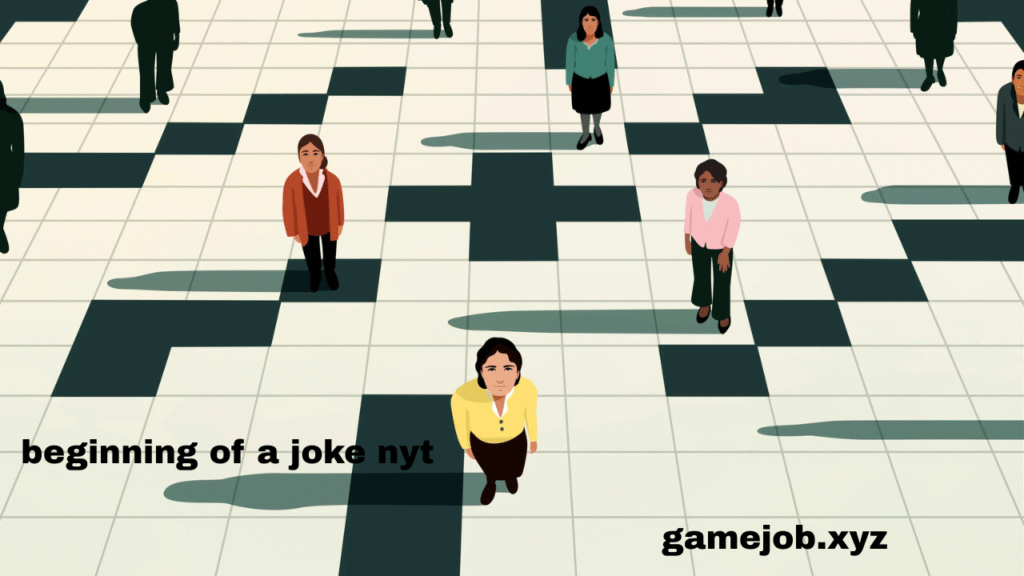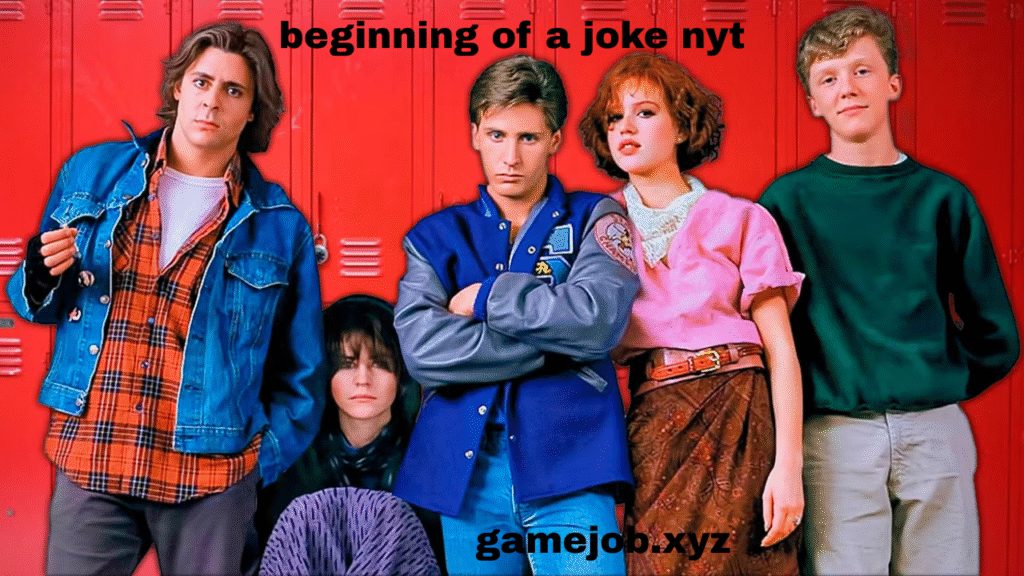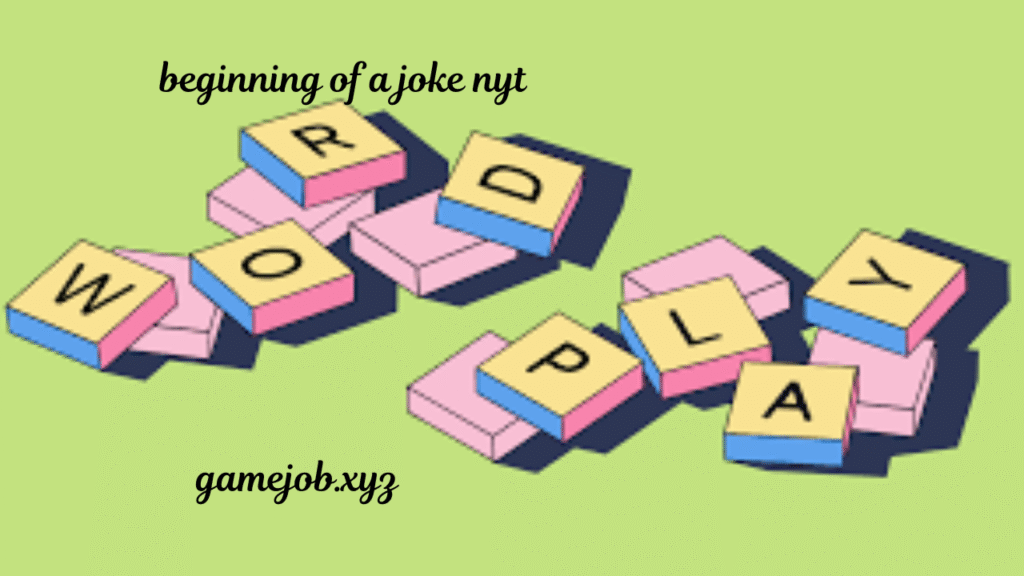Introduction: What’s in a Joke? Or Rather, the Beginning of One?
“Beginning of a joke NYT, ??” — it’s a phrase that might seem cryptic at first glance. It evokes curiosity, amusement, and the nagging feeling that you’re missing a punchline. For many crossword enthusiasts, this phrase isn’t just a puzzling snippet. It’s a reference to the clever, word-twisting, brain-tickling realm of The New York Times (NYT) Crossword. But beyond that, this phrase invites a deeper dive into humor, language, wordplay, and the intersections of modern media and culture.
In this article, we explore the many layers behind the idea of a “beginning of a joke,” especially in the context of the NYT crossword, the mystery implied by “??”, and what it means to search for meaning in a setup that might never quite deliver the punchline.
The NYT Crossword and the Art of the Incomplete Joke

For anyone who’s ever tackled the NYT Crossword, the phrase “beginning of a joke NYT” likely brings up memories of themed clues and multi-part answers. These puzzles often include clues that set up a joke or play on familiar idioms but leave you hanging until you piece the rest together through intersecting answers.
In some NYT crossword puzzles, you might encounter a clue labeled as something like “Beginning of a joke: ‘A priest, a rabbi, and a…'” followed by “Part 2 of the joke,” “Part 3,” and so on. This kind of thematic clue draws solvers into a meta-game — you’re not just solving for words, you’re solving for humor, rhythm, and cultural recognition.
The mystery deepens when clues simply include “??” — a double question mark often signals that something abstract or surprising is going on. It might be a pun, a twist, or an intentionally misleading setup. In this sense, “beginning of a joke NYT, ??,” is more than just a search phrase. It’s a conceptual puzzle. It’s the setup and the mystery of not yet knowing the punchline.
Why Do We Love an Unfinished Joke?

There’s something uniquely human about our obsession with setups. A punchline can be funny, but it’s the suspense of the unknown — the moment before the curtain falls — that holds power. The “beginning of a joke” is like the first page of a mystery novel. You have to know what comes next. You lean in. You imagine possibilities. You guess. You wonder. That’s where engagement begins.
In crossword culture, the clues labeled with “??” are the ones that make you pause and smile when you finally crack them. There’s delight in the twist. There’s satisfaction in the “Aha!” moment. So, when a clue reads “beginning of a joke” and all you get is “??”, the intrigue intensifies. Is the joke hidden? Will it unfold across other clues? Or is the whole point that there’s no punchline — just the open-ended, comedic possibility?
Humor as a Puzzle: The Genius of Wordplay

The brilliance of the NYT crossword lies not just in vocabulary, but in linguistic creativity. Humor, especially in the form of puns and idioms, is a playground for crossword constructors. They take apart language, rearrange it, hide meanings inside meanings — much like a comedian takes a mundane observation and spins it into gold.
When a clue says “beginning of a joke” followed by a couple of letters or a mystery indicator like “??”, it’s an invitation to think laterally. Not just what the words say, but what they imply. Is it referencing a common phrase? A twist on a known joke structure? A reworking of a cliché?
Sometimes the joke never resolves in a traditional way. And that’s okay. Because the humor is in the unexpected answer. The joke might be that there isn’t a punchline — or that the punchline is disguised as something else entirely.
The Internet Age: Meme Culture, Virality, and the ?? Mystery
Outside the crossword world, the phrase “beginning of a joke” has taken on new life in meme culture. Social media is full of tweets and posts that mimic the classic “A guy walks into a bar…” format, only to flip it upside down:
- “A philosopher, a physicist, and a priest walk into a bar. The bartender says, ‘What is this, some kind of joke?’”
- “So I start telling a joke… and then I forget the punchline. ??”
This reflects a cultural shift where meta-humor, self-awareness, and ambiguity have become part of the joke itself. The “??” becomes a stand-in for the absurdity of trying to find logic in humor, or completion in a world that thrives on open loops.
People enter “beginning of a joke nyt,??” into search boxes for this reason. They’re searching for a moment of recognition, not just a hint. Perhaps it’s a shared giggle, a eureka moment, or just an acceptance of the peculiar pleasure that comes from ignorance.
Language, Structure, and the Philosophy of the Punchline
Zooming out, the structure of jokes mirrors the structure of knowledge itself: you begin with a premise, you build toward expectation, and you subvert it. That’s the punchline. But what if you never reach the punchline?
The NYT Crossword and phrases like “beginning of a joke, ??,” tap into this deeper philosophical theme. Our brains are wired for completion. We want answers. But in both jokes and puzzles, the best moments often come from the surprise — the deviation from what we expected. That “??” is not a lack — it’s an intentional signal: “Pay attention. Something clever is coming — or already happened, and you missed it.”
The End… Or Is It Just the Beginning?
So what do we make of “beginning of a joke nyt, ??”? Is it a literal crossword clue? A metaphor for uncertainty? A placeholder for cultural expression? It might be all those things at once.
In the world of The New York Times crosswords, it could be the starting line for a clever multi-part theme. In the world of internet memes, it’s the shared language of confusion and cleverness. In our everyday lives, it might just be a reminder that not every joke has to end — sometimes, the setup is enough.
So next time you see “beginning of a joke” followed by “??”, don’t just scroll past it or search for the answer. Sit with it. Let your mind wander. Let it be the spark that lights a mental trail of curiosity, confusion, and maybe — just maybe — laughter.
Final Thoughts: Keep Guessing
In both crosswords and comedy, the beauty often lies in the unexpected. “Beginning of a joke nyt, ??,” might seem simple or confusing, but it embodies a deeper idea: the joy of not knowing, the thrill of seeking answers, and the eternal human habit of turning mystery into meaning.
Sometimes, the joke begins and never ends. And maybe, just maybe — that’s the joke.
ALso Read : Unlocking the Secrets of Roblox Clicker: The Ultimate Guide to Roblox Clicker Games and Strategies